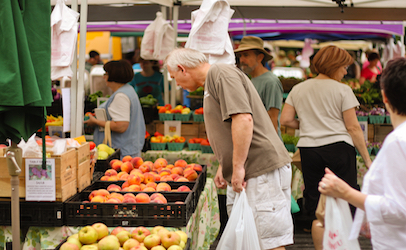If your business was subject to an unannounced, warrantless inspection, would you rather it be state or federal officials knocking on your door?
That very question is being raised in Virginia for about 400 farms that produce more than $25,000 in annual income from fresh fruits and vegetables. Those farms are subject to the rules and regulations of the federal Food Safety Modernization Act (FSMA), including warrantless inspections.
 Most warrantless inspections are prohibited by both the U.S. Constitution and Virginia Constitution, but they are called for by FSMA. That means inspectors from the U.S. Food and Drug Administration will, for the first time ever, be showing up on Virginia farms, unless the state agrees to take on job itself.
Most warrantless inspections are prohibited by both the U.S. Constitution and Virginia Constitution, but they are called for by FSMA. That means inspectors from the U.S. Food and Drug Administration will, for the first time ever, be showing up on Virginia farms, unless the state agrees to take on job itself.
The Virginia Senate last week agreed the state should take on the task, approving Senate Bill 1195 by a 25-15 bipartisan vote.
Virginia Agriculture Commissioner Sandra Adams said it is “a question of whether we do the inspections or the FDA.” After the state Senate approved the bill, it was assigned to the House Committee on Agriculture, Chesapeake and Natural Resources on Friday.
During the first two years, the Virginia Department of Agriculture plans no inspections but education and outreach to Virginia’s fresh produce growers. States taking over inspections from FDA are usually compensated by the federal agency. State agricultural commissioners and department directors also want funding in the next federal farm bill to help growers make investments needed to comply with FSMA.
Most farms won’t have to comply with FSMA because of the so-called Tester Amendment, which excludes businesses making less than $25,000 annually from produce sales. That provision was inserted into FSMA in 2010, shortly before its passage, by Sen. Jon Tester, D-MT, the only farmer in the Senate. It means that about 1,900 of Virginia’s 2,300 farms won’t have to worry about meeting the food safety rules and requirements of FSMA.
Still, the Virginia Independent Consumers and Farmers Association has come out against SB 1195, and Virginia’s House of Delegates has a reputation for being more strident than the upper chamber on some constitutional issues.
Yet, Virginia farmers seem to be united on the notion that if there are going to be inspections, they’d sooner have them done by the state agriculture department than FDA.
According to one published report, 40 states have already signed up to do their own inspections. While that number isn’t confirmed, FDA’s “Investigations Operations Manual” is clear that agency personnel have the “authority to enter and inspect.”
“FDA’s establishment inspection procedures maintain this authority extends to what is reasonably necessary to achieve the objective of the inspection,” says FDA’s manual.
The manual tells FDA personnel “various acts” confer “the authority” for warrantless inspections to the secretary of the Department of Health and Human Services, which is then delegated to the FDA commissioner and “further delegated by him.”
FDA staff are thus empowered to make warrantless inspections and obtain records. The inspectors are required to present credentials, which may not be copied, and leave a signed notice of inspection.
The federal inspectors may back off it they are verbally or physically threatened, but they can return with federal marshals. If they come across a facility where someone is also living, they are also suppose to back off and get a warrant.
Before it was approved by the Virginia Senate, SB 1195 was amended to include a sunset clause to automatically repeal it if FSMA’s regulations are repealed, defunded or ruled unconstitutional. There was also a cap put on the number of Virginia farms that would be inspected.
(To sign up for a free subscription to Food Safety News, click here.)
